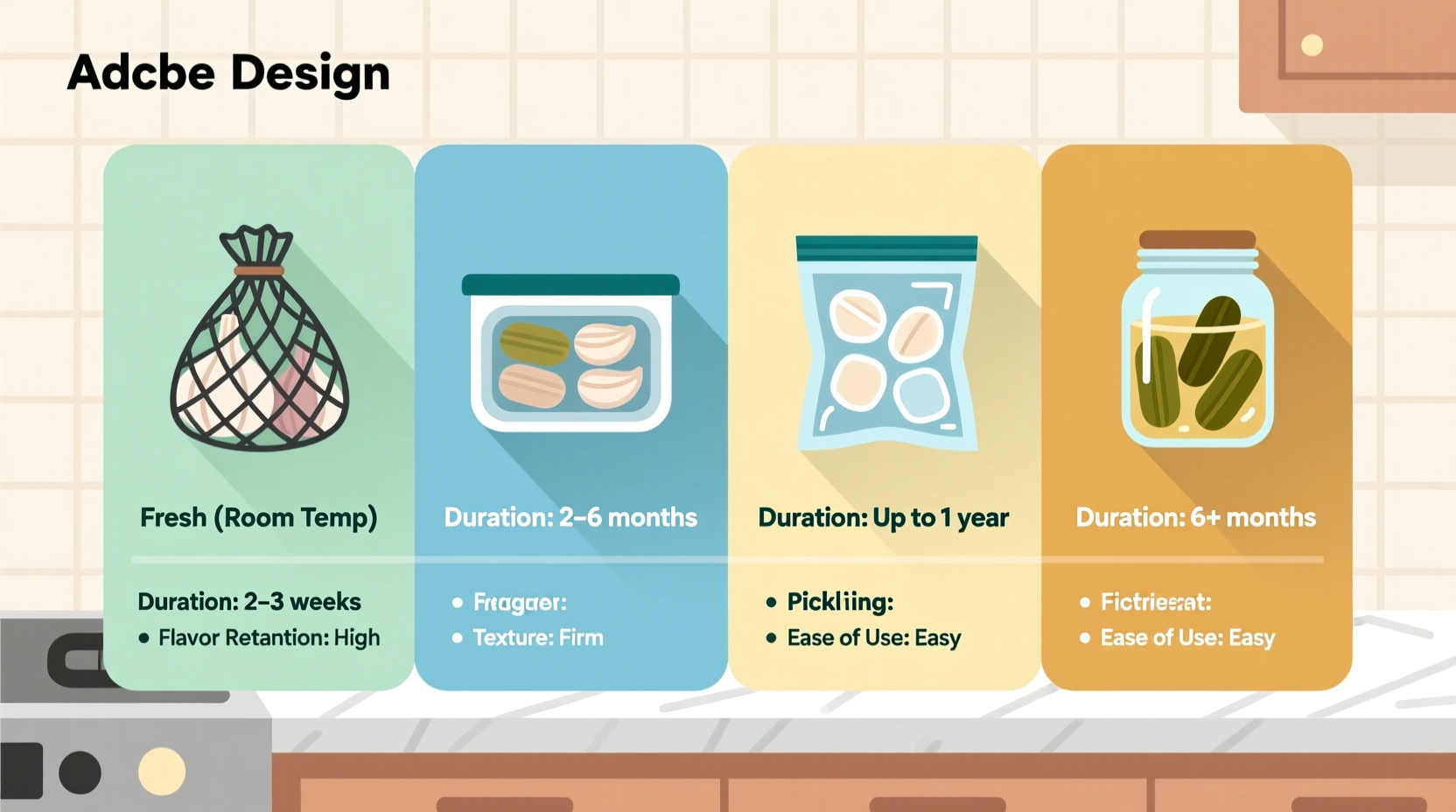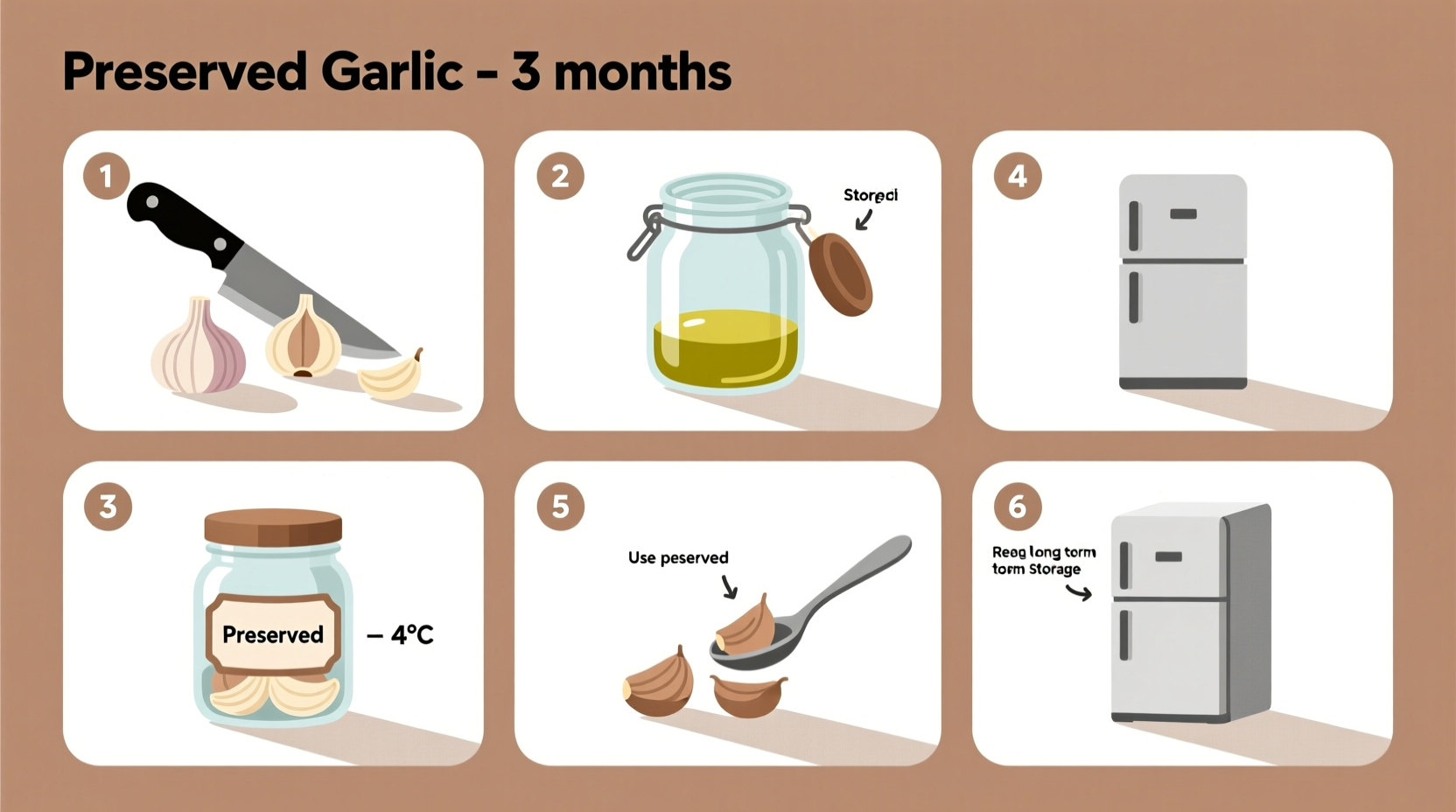Garlic transforms ordinary dishes into extraordinary culinary experiences, but its short shelf life frustrates home cooks worldwide. Understanding proper preservation techniques ensures you'll always have fresh-tasting garlic available while avoiding food waste. This comprehensive guide reveals professional methods backed by food science to maximize your garlic's lifespan without compromising flavor.
Why Proper Garlic Preservation Matters
Improperly stored garlic develops mold, sprouts prematurely, or loses its characteristic pungency. The National Center for Home Food Preservation confirms that correct storage techniques can extend garlic's usability by 300-500% compared to haphazard methods. Whether you've harvested your own crop or bought in bulk, these preservation approaches maintain both safety and flavor integrity.
Short-Term Preservation: 1-4 Weeks
When you need garlic to last through your weekly meal prep, these immediate solutions work best:
Room Temperature Storage
Store unpeeled garlic bulbs in a cool, dark place with good air circulation. A mesh bag or wire basket in your pantry maintains ideal conditions. Avoid plastic bags which trap moisture and accelerate spoilage. The USDA recommends temperatures between 60-65°F (15-18°C) with 60-70% humidity for optimal short-term storage.
Refrigeration Method
For individual cloves already separated from the bulb, place them in an airtight container in your refrigerator's crisper drawer. This technique works well for 2-3 weeks but may cause slight texture changes. Never store whole bulbs in the fridge as cold temperatures trigger premature sprouting.
Medium-Term Preservation: 1-6 Months
These methods preserve garlic's fresh characteristics while extending usability for several months:
Freezing Garlic Cloves
Freezing maintains garlic's raw flavor profile better than most methods. Simply peel cloves, place them in a single layer on a baking sheet, freeze until solid, then transfer to airtight freezer bags. Frozen garlic works perfectly for cooking—no need to thaw. For convenience, blend peeled cloves with oil and freeze in ice cube trays.
Oil Preservation Technique
Submerging peeled cloves in oil creates ready-to-use garlic but requires careful handling. The National Center for Home Food Preservation emphasizes: "Never store garlic in oil at room temperature due to botulism risk." Refrigerate oil-preserved garlic and use within 3-4 months. Add acid (lemon juice or vinegar) to increase safety.
| Preservation Method | Shelf Life | Flavor Impact | Best For |
|---|---|---|---|
| Room Temperature | 1-2 months | Original flavor | Whole bulbs |
| Refrigeration | 3-6 weeks | Slight softening | Separated cloves |
| Freezing | 6-12 months | Raw flavor intact | Cooking applications |
| Oil Preservation | 3-4 months (refrigerated) | Mellowed flavor | Ready-to-use garlic |
| Dehydration | 1+ year | Concentrated flavor | Seasoning blends |
Long-Term Preservation: 6+ Months
For gardeners with surplus harvests or bulk buyers, these professional techniques deliver exceptional longevity:
Dehydrating Garlic
Slice cloves uniformly and dehydrate at 135°F (57°C) until brittle. Properly dried garlic stores for over a year in airtight containers. Rehydrate by soaking in warm water or add directly to soups and stews. Dehydrated garlic concentrates flavor, requiring less in recipes.
Pickling Garlic
Vinegar preservation creates tangy garlic ready for salads and sandwiches. The FDA's Complete Guide to Home Canning confirms that properly processed pickled garlic remains safe for 12-18 months. Use clean jars, distilled vinegar (5% acidity), and follow tested recipes for safety.

Avoiding Common Preservation Mistakes
Food safety experts identify these critical errors that compromise garlic preservation:
- Room temperature oil storage - Creates perfect conditions for botulism toxin production
- Storing near heat sources - Accelerates sprouting and drying
- Washing before storage - Introduces moisture that promotes mold
- Using damaged cloves - Spoilage spreads to healthy cloves
When Preservation Goes Wrong: Safety Indicators
Discard garlic showing any of these warning signs:
- Visible mold (fuzzy spots of any color)
- Soft or mushy texture
- Unpleasant sour or rancid odor
- Bulb or cloves turning yellow or brown
- Garlic stored in oil showing bubbling or cloudiness
Professional Chef Tips for Maximum Flavor
Seasoned culinary professionals recommend these advanced techniques:
- "Preserve different garlic varieties separately—each responds uniquely to preservation methods," advises Chef Rodriguez
- "Add a sprig of rosemary to oil-preserved garlic—it naturally inhibits bacterial growth while enhancing flavor"
- "Freeze roasted garlic in portions matching your typical recipe needs for instant flavor boosts"
- "Dehydrated garlic reconstitutes best in broth rather than water for deeper flavor"
Choosing the Right Method for Your Needs
Your preservation choice depends on three factors:
- Intended use - Cooking vs. raw applications
- Timeframe - How long you need preservation
- Flavor preference - Raw bite vs. mellowed notes
For immediate cooking needs, freezing works best. For salad dressings and raw applications, refrigerated oil preservation (used within 4 days) maintains freshness. Long-term flavor concentration favors dehydration.
Frequently Asked Questions
Can I preserve garlic in olive oil at room temperature?
No, storing garlic in oil at room temperature creates ideal conditions for botulism toxin production. The National Center for Home Food Preservation requires refrigeration below 40°F (4°C) for oil-preserved garlic, with consumption within 3-4 months.
How long does frozen garlic last?
Properly frozen garlic maintains quality for 6-12 months. For best results, freeze peeled cloves in a single layer before transferring to airtight containers. Frozen garlic works perfectly in cooked dishes without thawing.
Why does my preserved garlic turn blue or green?
Color changes in preserved garlic result from natural chemical reactions between sulfur compounds and acids. The USDA confirms this is harmless and doesn't affect safety, though flavor may be slightly altered. Adding lemon juice can prevent this reaction.
Can I dehydrate garlic without a dehydrator?
Yes, you can use your oven on the lowest setting (170°F/77°C) with the door slightly ajar. Rotate trays frequently for even drying. Properly dehydrated garlic should snap cleanly when bent and store for 1+ year in airtight containers.











 浙公网安备
33010002000092号
浙公网安备
33010002000092号 浙B2-20120091-4
浙B2-20120091-4